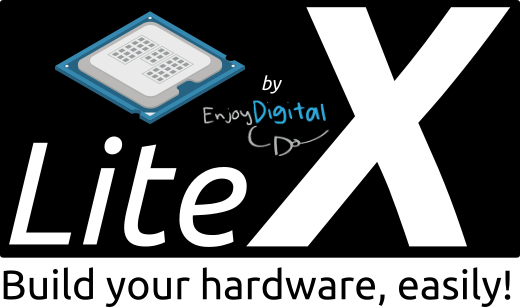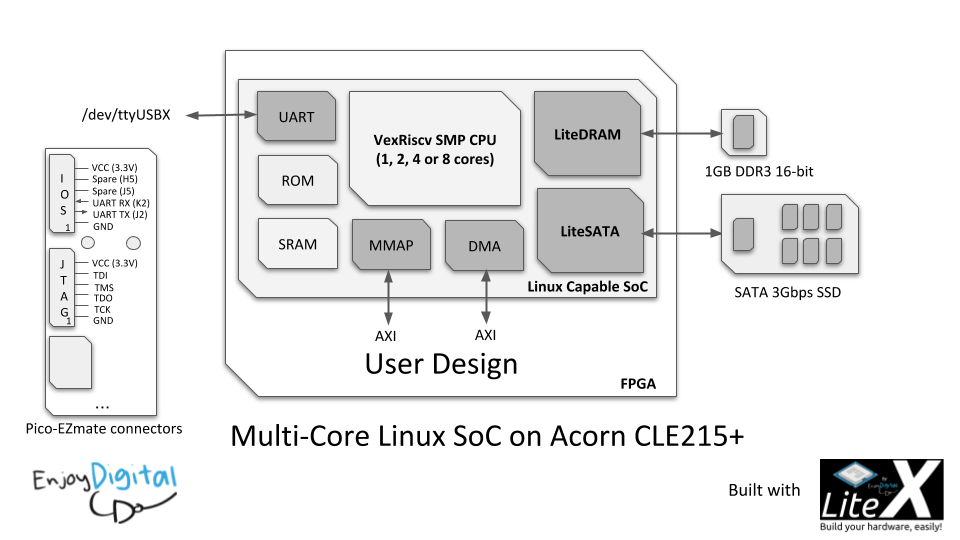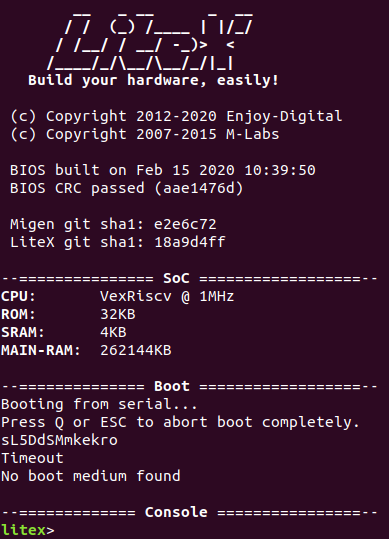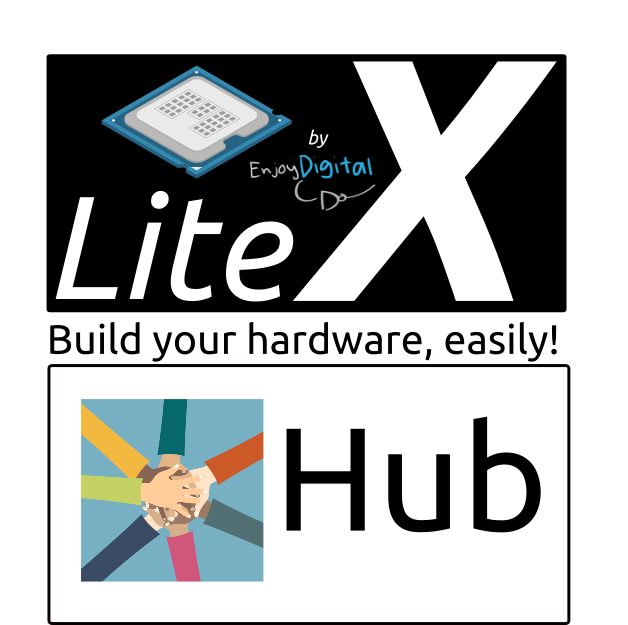* resolve issue #862 add description to soc.svd The issue is that with no description provided it simply would not put out a description tag, which breaks compatibility with other programs. Insert a somewhat useful default description including a timestamp and the words "LiteX SoC". * I2S fix: sample SYNC on the correct edge The original Tx path implementation samples SYNC on the falling edge, out of convenience with the fact that teh data must also change on the falling edge. This works OK, until you have a CODEC which has a ~40ns max delay spec on the SYNC, and also has a slightly asymmetric SYNC edge (the SYNC signal is also the WCLK or LRCLK depending on which docs you read). The SYNC by spec is supposed to change on the falling edge, and this extra delay is enough to cause the SYNC to introduce occassional bit or frame shifts into the audio. This fix samples the SYNC on the rising edge, but still changes the data on the falling edge, thus allowing for implementations where SYNC has quite loose timings relative to everything else (as is the case on the TLV320AIC3200) |
||
|---|---|---|
| .github/workflows | ||
| doc | ||
| litex | ||
| test | ||
| .gitignore | ||
| CHANGES | ||
| CONTRIBUTORS | ||
| LICENSE | ||
| litex_setup.py | ||
| MANIFEST.in | ||
| README.md | ||
| setup.py | ||

Copyright 2012-2021 / Enjoy-Digital
Welcome to LiteX!
LiteX is a Migen/MiSoC based Core/SoC builder that provides the infrastructure to easily create Cores/SoCs (with or without CPU). The common components of a SoC are provided directly: Buses and Streams (Wishbone, AXI, Avalon-ST), Interconnect, Common cores (RAM, ROM, Timer, UART, etc...), CPU wrappers/integration, etc... and SoC creation capabilities can be greatly extended with the ecosystem of LiteX cores (DRAM, PCIe, Ethernet, SATA, etc...) that can be integrated/simulated/build easily with LiteX. It also provides build backends for open-source and vendors toolchains.
Think of Migen as a toolbox to create FPGA designs in Python and LiteX as a SoC builder to create/develop/debug FPGA SoCs in Python.
Want to get started and/or looking for documentation? Make sure to visit the Wiki!
A question or want to get in touch? Our IRC channel is #litex at freenode.net
Typical LiteX design flow:
+---------------+
|FPGA toolchains|
+----^-----+----+
| |
+--+-----v--+
+-------+ | |
| Migen +--------> |
+-------+ | | Your design
| LiteX +---> ready to be used!
| |
+----------------------+ | |
|LiteX Cores Ecosystem +--> |
+----------------------+ +-^-------^-+
(Eth, SATA, DRAM, USB, | |
PCIe, Video, etc...) + +
board target
file file
LiteX already supports various softcores CPUs: VexRiscv, Rocket, LM32, Mor1kx, PicoRV32, BlackParrot and is compatible with the LiteX's Cores Ecosystem:
| Name | Build Status | Description |
|---|---|---|
| LiteX-Boards | Boards support | |
| LiteDRAM | DRAM | |
| LiteEth | Ethernet | |
| LitePCIe | PCIe | |
| LiteSATA | SATA | |
| LiteSDCard | SD card | |
| LiteICLink | Inter-Chip communication | |
| LiteJESD204B | JESD204B | |
| LiteVideo | VGA, DVI, HDMI | |
| LiteScope | Logic analyzer |
By combining LiteX with the ecosystem of cores, creating complex SoCs becomes easier than with traditional tools while providing better portability and flexibility. Here are some projects created recently with the tools:
A Multi-core Linux Capable SoC based on VexRiscv-SMP CPU, LiteDRAM, LiteSATA and integrated with LiteX:
 For more info, have a look at Linux-on-LiteX-Vexriscv project and try running Linux on your FPGA board!
For more info, have a look at Linux-on-LiteX-Vexriscv project and try running Linux on your FPGA board!
A custom PCIe SDI Capture/Playback board built around LitePCIe and integrated with LiteX, allowing full control of the SDI flow and very low latency.
 To discover more products/projects built with LiteX, visit the projects page on the Wiki.
To discover more products/projects built with LiteX, visit the projects page on the Wiki.
Papers, Presentations, Tutorials, Links
FPGA lessons/tutorials:
Migen tutorial:
OSDA 2019 paper/slides:
Linux on LiteX-Vexriscv:
RISC-V Getting Started Guide:
LiteX vs. Vivado First Impressions:
35C3 - Snakes and Rabbits - How CCC shaped an open hardware success:
Tim has to many projects - LatchUp Edition: https://www.youtube.com/watch?v=v7WrTmexod0
Sub-packages
litex.gen Provides specific or experimental modules to generate HDL that are not integrated in Migen.
litex.build: Provides tools to build FPGA bitstreams (interface to vendor toolchains) and to simulate HDL code or full SoCs.
litex.soc: Provides definitions/modules to build cores (bus, bank, flow), cores and tools to build a SoC from such cores.
Quick start guide
- Install Python 3.6+ and FPGA vendor's development tools and/or Verilator.
- Install Migen/LiteX and the LiteX's cores:
$ wget https://raw.githubusercontent.com/enjoy-digital/litex/master/litex_setup.py
$ chmod +x litex_setup.py
$ ./litex_setup.py init install --user (--user to install to user directory)
Later, if you need to update all repositories:
$ ./litex_setup.py update
Note: On MacOS, make sure you have HomeBrew installed. Then do,
brew install wget.
Note: On Windows, it's possible you'll have to set
SHELLenvironment variable toSHELL=cmd.exe.
- Install a RISC-V toolchain (Only if you want to test/create a SoC with a CPU):
$ ./litex_setup.py gcc
- Build the target of your board...:
Go to litex-boards/litex_boards/targets and execute the target you want to build.
- ... and/or install Verilator and test LiteX directly on your computer without any FPGA board:
On Linux (Ubuntu):
$ sudo apt install libevent-dev libjson-c-dev verilator
$ lxsim --cpu-type=vexriscv
On MacOS:
$ brew install json-c verilator libevent
$ brew cask install tuntap
$ lxsim --cpu-type=vexriscv
- Run a terminal program on the board's serial port at 115200 8-N-1.
You should get the BIOS prompt like the one below.

Community

LiteX has been initially developed by EnjoyDigital to create custom SoCs/Systems for our clients (and we are still using it for that purpose :)); but over the years a friendly community has grown around LiteX and the ecosystem of cores. Feedbacks and contributions have already greatly improved the project, EnjoyDigital still leads the development but it is now a community project and collaborative projects created around/with LiteX can be found at https://github.com/litex-hub.
Contact
E-mail: florent@enjoy-digital.fr
